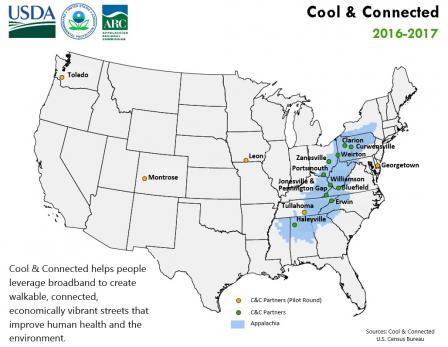Cool & Connected
Background
 Click on the map to enlarge.Cool & Connected, a planning assistance program sponsored by the U.S. Department of Agriculture Rural Utilities Service, EPA's Office of Sustainable Communities, and the Appalachian Regional Commission, helps small towns use broadband service to revitalize main streets.
Click on the map to enlarge.Cool & Connected, a planning assistance program sponsored by the U.S. Department of Agriculture Rural Utilities Service, EPA's Office of Sustainable Communities, and the Appalachian Regional Commission, helps small towns use broadband service to revitalize main streets.
Communities can combine broadband service with other local assets such as cultural and recreational amenities to attract investment and people, including young people, and diversify local economies.
Through Cool & Connected, a team of experts helps community members develop strategies and an action plan for using broadband to create walkable, connected, economically vibrant main streets and small-town neighborhoods that improve human health and the environment.
See our Smart Growth in Small Towns and Rural Communities page to learn more about how smart growth strategies can help rural places strengthen their economies, improve quality of life, and protect the environment and human health.
Fall 2016 Application
The fall 2016 round of Cool & Connected assistance closed on November 6, 2016. The call for applications and application form are available for reference only.
Appalachia Partner Communities
The Appalachia partner communities, announced in August 2016, are:
- Haleyville, Alabama, which will pursue a downtown broadband strategy that promotes business recruitment and development, diversifies the economy, and connects the library and city hall to people through digital archives and e-government initiatives.
- Portsmouth, Ohio, where the Southern Ohio Port Authority aims to use the historic and commercial districts’ broadband and public Wi-Fi to encourage more people to walk and open businesses, as well as connect downtown amenities to recreation areas with information kiosks and QR Code/smart phone technology.
- Zanesville, Ohio, which will receive planning assistance to increase new employment opportunities, support the emerging arts culture, and develop an app for visitors to explore the walkable downtown.
- Clarion, Pennsylvania, which will receive planning assistance to increase its local communications capacity to market nature-based tourism, motivate people to invest along the historic Main Street, and create an incentive for students at Clarion University to stay in the community.
- Curwensville, Pennsylvania, where the Curwensville Regional Development Corporation plans to create a downtown coworking space for professionals, students, or entrepreneurs to use as an alternative to working from home or commuting long distances.
- Erwin, Tennessee, and Erwin Utilities, which will receive planning assistance to construct a comprehensive marketing plan for the downtown broadband connection to attract young professionals, visitors, and investors.
- Jonesville and Pennington Gap, Virginia, which will receive planning assistance to market and develop Wi-Fi zones, extend broadband service, and promote Main Street development by attracting anchor tenants.
- Bluefield, West Virginia, which will help downtown businesses take advantage of broadband and promote startups under the city's new Creating Resilient Economies by Assisting Transforming Entrepreneurs (CREATE) initiative.
- Weirton, West Virginia, where the Mary H. Weir Public Library and community partners will receive planning assistance to increase and expand broadband services and Wi-Fi zones to bring visitors, families, and businesses to the downtown.
- Williamson, West Virginia, where the Williamson Health and Wellness Center will leverage broadband access and Wi-Fi zones downtown and at educational institutions to cultivate a skilled workforce, help people open businesses, and enhance the use of health care technology.
Read the summary report about the Appalachia partner communities.
Read the August 24, 2016, press release.
Pilot-Phase Partner Communities
The pilot-phase partner communities are:
- Georgetown, Delaware, which will explore strategies to leverage new broadband infrastructure serving county facilities to provide public internet access and to attract and retain businesses downtown.
- Leon, Iowa, which will develop a strategy for implementing a free Wi-Fi zone in its downtown square to draw more economic activity and provide low-income residents with internet access.
- Montrose, Colorado, which will combine its new broadband service with other downtown assets (including a farmers market), to promote local food access, accelerate main street development, and attract visitors.
- Toledo, Washington, which will use its new broadband network to support business and tourism downtown that will build on Vision: Toledo, a grassroots coalition of people committed to community revitalization.
- Tullahoma, Tennessee, which will receive technical assistance to market downtown Tullahoma as a free Wi-Fi zone and develop a physical work-share space to complement new infrastructure investments and add to the growth of downtown businesses.
Read the May 5, 2016, press release.
